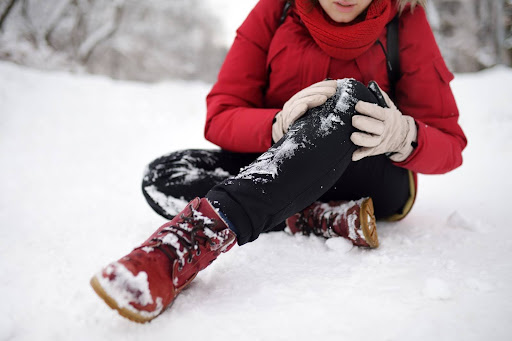
Slip-and-fall accidents can happen to anyone, anywhere. In Illinois, seasonal weather conditions, recreational fun, or poorly maintained properties can increase the risk of injury. Whether it’s a slippery floor, icy sidewalk, uneven surface, or other unsafe circumstances, these types of accidents are often the result of a property owner’s negligence.
If you get injured in a slip-and-fall accident, a personal injury lawyer, like those at Lerner and Rowe, has experience representing slip-and-fall injury claims in Chicago.
Statistics Relating to Slip and Fall Injury Claims in Chicago
Slip and fall accidents are a common occurrence in Illinois, as well as other states throughout the nation. The National Safety Council (NSC) says that:
- In 2021, there were 6.9 million emergency room visits due to slip-and-fall accidents.
- Construction workers are at the most risk of work-related slips and falls.
- Slip-and-fall accidents are the second-leading cause of wrongful deaths.
Slip-and-fall accidents can happen in any situation but frequently happen in stores, sidewalks, and other public places. Contact Lerner and Rowe when you want a law firm with experience representing slip and fall injury claims in Chicago.
Illinois Laws Regarding Premises Liability
Illinois premises liability laws determine liability in slip-and-fall accidents. In Illinois, property or business owners have a duty of care to prevent conditions that could lead to these injuries. Whether it’s a crack in the sidewalk or a spill in a store, owners must regularly inspect, identify, and remedy hazards within a reasonable amount of time.
Illinois is a comparative negligence state, meaning the injured party may recover damages if they are up to 50% liable. The responsible party will be held liable if the injured person can prove that the property owner either knew or should have known of this danger and neglected to fix it properly. This typically involves establishing that the danger existed long enough to permit a property owner to do something about it.
In inclement weather, like snow, the property owner may not be liable for natural accumulation. However, if the owner attempted to remove the snow and create another condition like ice, they could be liable due to a slip-and-fall on ice. Generally speaking, the natural accumulation rule does not apply to stores, as public places should protect the safety of guests.
Common Causes of Slip and Fall Accidents
Multiple causes of slip-and-fall accidents exist. Poor lighting is one of the common causes, contributing to some 10% of all slip-and-fall accidents. Other causes of slip-and-fall injuries include wet or slippery surfaces, the absence of handrails, obstructions in walkways, uneven floors, and hazards from weather conditions such as ice or snow.
Sometimes, a plaintiff is partially responsible for an accident. Let’s say that someone slipped and fell on a cracked sidewalk. Suppose that person was walking from a bar and was intoxicated. In that case, they might be 20% liable (a jury determines the actual percentage) for the accident, and their damages will be adjusted accordingly.
Even though multiple factors can determine the cause of a slip-and-fall accident, the court system hinges on one argument:
- Did the property or business owner have a duty of care to prevent an accident?
- Was there a breach of care, or did the owner’s action or inaction create a situation that caused the accident?
- Did the breach of care cause the injury?
- What are the damages to the plaintiff?
Negligence is at the heart of virtually every personal injury case. Medical records, witness testimony, and expert witnesses can help prove liability in Chicago slip-and-fall injury claims.
Steps to Take after a Slip and Fall Accident
After receiving medical attention, you need to consult a Chicago personal injury attorney like Lerner and Rowe. Here is how you should prepare for your initial consultation:
- Bring in any relevant documentation and evidence related to the accident, including police reports if they were involved, contact information for potential witnesses, photos and videos of the accident scene and your injuries, as well as any information about the location of the fall. This evidence will help establish causation and determine liability.
- If you have any information from any insurance company, make sure that you bring in your copy.
- You should have documents such as medical bills, pay stubs, and other expenses related to the incident. These help establish economic damages.
After your personal injury attorney has reviewed your case, don’t speak to insurance adjusters or the other party or make any decisions about your case without consulting your lawyer. This ensures that your legal rights are protected and you will receive the compensation you are entitled to.
Contact a 24/7 Lawyer That Represents Slip and Fall Injury Claims in Chicago
If you need a Chicago slip-and-fall lawyer, look for seasoned attorneys with proven experience in cases similar to yours. Knowing premises liability law is important because the attorney will be more familiar with Illinois laws and court case precedence.
Contact Lerner and Rowe for a no-cost consultation today. They can provide legal advice and representation tailored to your unique circumstances. Our Chicago slip-and-fall lawyers can assist you 24 hours a day, 7 days a week.
The information on this blog is for general information purposes only. Nothing herein should be taken as legal advice for any individual case or situation. This information is not intended to create, and receipt or viewing does not constitute, an attorney-client relationship.



